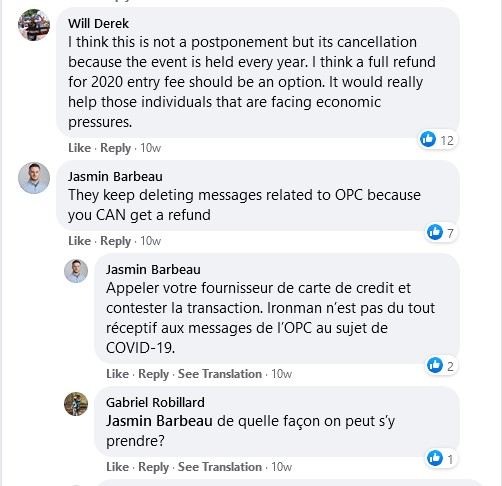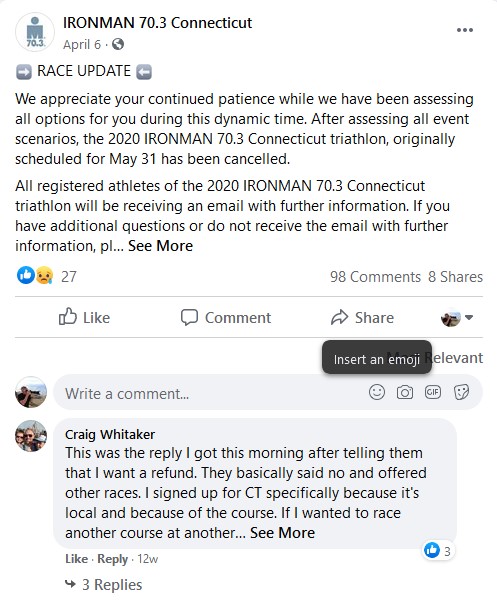Ironman athletes lash out over lack of refunds
Ironman's no-refund policy has led to the filing of a class-action law suit against the company.
 Photo by:
Kevin Mackinnon
Photo by:
Kevin Mackinnon
Kelli Blake wasn’t going to accept that Ironman couldn’t give her a refund for her entry to Ironman 70.3 Musselman after the race was “postponed” to 2021. After hours of phone conversations with the Ironman athlete services department, she finally said to the supervisor she’d been referred to:
“This is not acceptable. You’re giving me tomatoes – lots of different versions of tomatoes. Do you want tomato soup? In a salad? I don’t want tomatoes. That’s not acceptable.”
When Ironman “postponed” the race, Blake, like the rest of the athletes registered for the event, was sent an email with a list of options. She could defer her entry to next year or could have her entry transferred to a different race scheduled for later this year. All those events were in the United States.
“How do you see that working?” she asked one of the Athlete Services representatives, pointing out that the Canada/ US border was closed and any re-opening in the near future remained very uncertain.
Despite those conversations, she received an email from Ironman. Pick another race by June 24 or forfeit your entry.
Blake is nothing if not persistent. If anyone embodies the Ironman philosophy of “Anything is Possible” it is the 59-year-old from Wasaga Beach, Ont. She had entered the Musselman event because it would be a great way to celebrate her 60th birthday in July. After doing her first triathlon in 2007, she’s done 43 events in total, including full-distance Ironman races in Mont-Tremblant and Muskoka.
“Ironman tells us they want us to be determined,” Blake says. “Find different pathways to get to the finish line. Overcome obstacles – all these different sayings and mantras they tell us to follow in order to be successful triathletes, because that’s how they make money. But, when I use those skills to talk to them and get a refund, they don’t like it.”
Blake would eventually end up on the phone with Keats McGonigal, Ironman’s Head of Operations for North America, who would offer her the opportunity to transfer her entry to a race in Canada either next year or the year after. When she kept pressing for a refund, he told her that he would put her in touch with the company’s legal department. She has yet to hear back from them.
Blake is hardly the only Ironman athlete who is frustrated with the company’s policies around “postponed” or “rescheduled” events. Ironman practically never says that an event is “cancelled” – on the Ironman COVID-19 update page the word appears exactly twice, for Ironman Maceiό Alagoas and Ironman Rio de Janeiro.

A look at Facebook posts on the event pages for races like Ironman 70.3 Mont-Tremblant or Ironman 70.3 Connecticut provide ample proof that athletes are not happy with the fact that Ironman will not provide refunds for events. That’s even though those same athletes are likely aware that when they entered the races the waiver they signed includes the following (or something similar): “If the race course or Event is changed, modified, delayed, or cancelled for any reason, including but not limited to acts of God or the elements (including without limitation, wind, rough water, rain, hail, hurricane, tornado, earthquake), acts of terrorism, fire, threatened or actual strike, labor difficulty, work stoppage, insurrection, war, public disaster, flood, unavoidable casualty, race course conditions, or any other cause beyond the control of WTC, there will be no refund of Organizer’s entry fee or any other costs incurred in connection with the Event.”
Some athletes are ready to take the company to court over its refund policy. In May a suit was filed against Ironman and Competitor Group “for not providing refunds during COVID-19,” according to the Top Class Actions website.
In this case the plaintiff, Mikaela Ellenwood, had registered for the Rock ‘n’ Roll Marathon Series half marathon in San Francisco, which was originally postponed, then rescheduled to next year.
“Ellenwood says that, because of the coronavirus, the defendants have attempted to reschedule or postpone many of the Ironman races that were scheduled to take place in 2020,” the story on the Top Class Action website continues. “However, the defendants have allegedly refused to provide a refund for cancelled events, forcing Class Members to participate in another event rescheduled later in 2020, re-register for a race in a different city for 2021 or defer their participation to 2021.”
“As a result of the postponement or cancellation, Defendants have not delivered the events for which Plaintiff and members of the class paid,” the Ironman Race 2020 class action lawsuit avers.”

Here at Triathlon Magazine Canada we’ve reported on the challenges race directors are facing when it comes to refunds after races have had to be cancelled due to the COVID-19 pandemic.
“I would strongly suggest that if an independent race or series of races were to lose a year of race revenue, they would be bankrupt,” Multisport Canada’s John Salt told us for a story we posted in March.
Salt pointed out that many race costs are spent months in advance. For this year Multisport Canada had already ordered all the race medals for the 2020 season by the time we published the story on March 17.
“Ninety per cent of all costs are due two to three months prior to an event; most of the products have been ordered, and services have been contracted,” Salt continued. “Postponing, or even cancelling a race, is always a worst-case scenario for everyone involved: athletes, the organization team, volunteers and sponsorship partners.”
Despite those challenges, the Multisport Series offered athletes a 75 per cent refund for the 2020 races after it was forced to cancel the series. Athletes also had the opportunity to defer their entry to 2021. What were they doing with the other 25 per cent?
“Make no mistake: COVID-19 is now the defining challenge of our generation,” the company says on its website. “MultiSport Canada is a small business, operating year-round with several full-time employees, 30+ part-time employees, an office and storage facilities for our equipment along with all costs associated with hosting each race. We carefully reviewed all our 2020 expenses and calculated what refund amount we can afford to offer. We want to be here in 2021 to produce the races you love.”
Ironman would certainly be in the same boat as other races, and presumably at an even bigger scale. To keep the business going, employees have had to take pay cuts, with senior management taking a more significant percentage cut.
For North American and Asian events Ironman doesn’t offer refunds, but does offer transfers to other races when available. In Europe, South Africa and Oceania athletes can get 50 per cent or 25 per cent refunds based on when they withdraw from the race – there is a deadline after which no refunds are available. Those policies remain in place, according to a spokesperson for Ironman, but “we are working with athletes, especially those with border and travel restrictions.”
Ironman has remained firm on these policies, unlike events in the Challenge-Family series that have been cancelled this year. Challenge St. Polten, for example, offered racers the opportunity to defer their entry to the following year or “live the values of the Challenge-Family” and get refunds, less applicable administration fees. When Challenge Roth, the largest full-distance event in the world, announced the cancellation in March, it offered refunds (less an administration fee), but asked athletes to waive part of their refund as a donation to the event.
“As you know, this is purely a family business, there is no other investor behind us who can support us or provide us with additional funds,” race director Felix Walchshöfer says in a video posted on the Challenge Roth website. “Nevertheless, we have a deep desire and a firm intention to organize our Challenge Roth event with the help of our athletes, friends and supporters – and it will be a good one – to lead the future. That is why we want to put something to you: for those who can, we ask you to voluntarily waive part of the refund in support of Challenge, the proceeds of which provide an emergency fund to ensure the long-term survival of our brand.”
Kelli Blake received a 75 per cent refund from the Multisport Triathlon Series for a race she had entered in that series this summer. She can’t understand why a small race series in Ontario can provide a refund, while the world’s largest endurance events organizer, Ironman, can’t.
She’s not the only Ironman athlete who feels that way.
